The Long Road Back Leads Wounded Army Shooter To Paralympics
Note: Here’s the Paralympics shooting schedule. Kevin Nguyen qualified in R6 Mixed 50m Prone Rifle SH1.
The following appears in the August issue of California Sportsman:
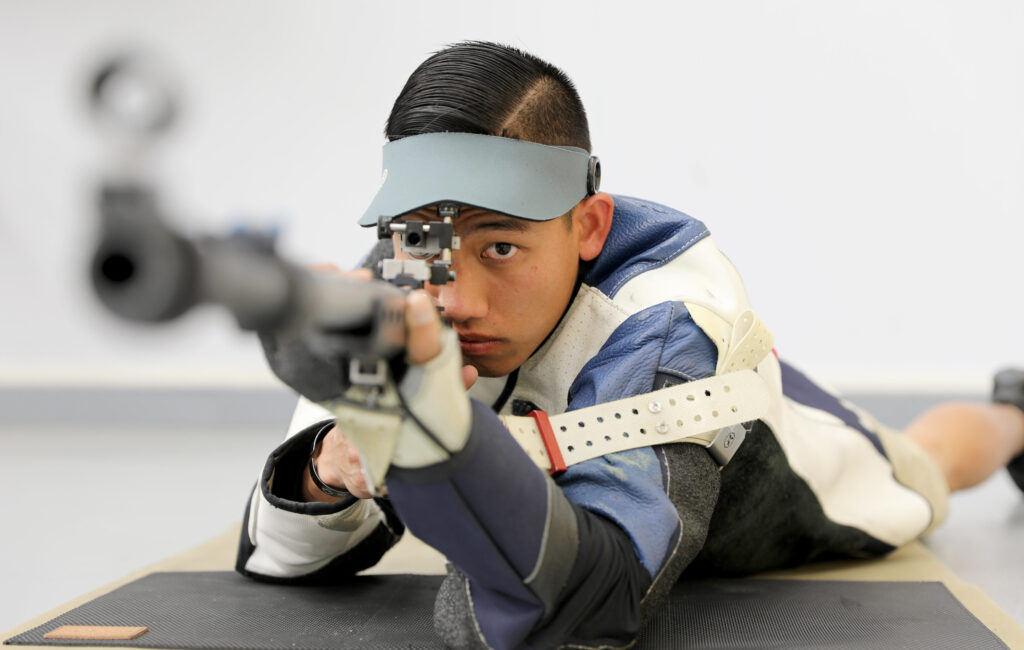
By Chris Cocoles
Kevin Nguyen, the Southern California-born son of immigrants who fled Vietnam during the horrific conflict there in the 1960s and ’70s for a better life in America, knew the risks he’d take by enlisting in the United States Army.
But when his unit was fighting in Afghanistan, Nguyen’s military career – not to mention his life – became something altogether different in a flash. On February 2, 2013, after stepping on an improvised explosive device, or IED, that severely injured one of his legs in Afghanistan’s Horn of Panjwai, Nguyen faced a long
rehabilitation path and ultimately, a difficult decision to either face a life on crutches or even a wheelchair, or the amputation option. More than a decade later, Nguyen, 31, can joke about what he learned from that pivotal moment that indeed resulted in the loss of his right leg.
“Watch where you step; LOL,” he deadpanned during an email interview.
After wrestling with the choice and suffering from bouts of depression over an almost two-year stint at a San Diego military hospital recovering from his battle wounds, fate intervened and Nguyen, now an Army staff sergeant, became a world-class shooter who will make his second consecutive appearance in the Paralympic Games in Paris, which begin on August 28 (Nguyen also appeared in the Covid-delayed Tokyo Paralympics back in 2021). Nguyen qualified for the 50-meter prone rifle event in France.
Now married to wife Ashley and together raising their infant son Noah, who turned six months old on July 18, Kevin Nguyen has thrived as a member of the elite U.S. Army Marksmanship Unit.
“Kevin is a great teammate,” says fellow Californian Sagen Maddalena, who is also now a two-time Olympic Games shooter and appeared on the cover of our July issue. “He is a professional at everything he puts his mind to, from being a soldier and leader of soldiers, to an athlete and competitor.”
Adds Sergeant First Class Henry “Hank” Gray, the Marksmanship Unit’s assistant team chief in international rifle, “SSG Nguyen is absolutely a positive, glass-half-full guy. Representing the Army and Team USA in international shooting competition has allowed him to continue his career in the Army after a devastating injury. He has truly embraced the opportunity he was given and represents the heart of a champion.”
“I know he had to go through some tough times in the early stages of recovery,” adds Gray, “but these days most people don’t even realize he is an amputee if they don’t see his prosthetic. He doesn’t shy away from challenges and does all the runs/ruck marches/obstacle courses with the rest of us all the time!”
We chatted with Nguyen about his injury and recovery process, his parents’ journey, Paris expectations and a very memorable introduction to hunting.

Chris Cocoles Congratulations on getting back to the Paralympics. What are your expectations for Paris after your Tokyo experience?
Staff Sergeant Kevin Nguyen As a returning Paralympian, my expectations are to better manage my nerves this go-around. Competing in the Games can be an overwhelming experience, so I’m hoping that my previous experience will play into my favor. With that being said, I hope to perform in a manner that reflects my training scores here at home.
CC What was your Tokyo experience like in your event and just getting a taste of the Games?
SSKN Performing on the world’s largest athletic stage was nerve-racking. All my training and work up until that point couldn’t have prepared me for the nerves that come with that level of competition.
CC Did you do anything differently in your quad this time around after qualifying for the Tokyo Games in terms of preparation and how you competed? Do you feel like you’re a better shooter this time around? SSKN The first quad was definitely a learning process. This time around, I worked more diligently to refine specific aspects of my performance and I definitely think I’m more prepared this time around. Overall, my efforts during this quad have left me with higher training scores, but maybe more importantly, a better grasp on managing my mental game and recovery.
CC Being a Paralympian or an Olympian is such a great honor but also such an exciting adventure. What are you most looking forward to when you get to Paris?
SSKN This time around I won’t be traveling alone. I’ll have my family by my side, which makes the whole experience even more special. Sharing this once-in-a-lifetime experience with my wife and son is something I’m super excited about.
CC Can you share what happened when you were wounded in Afghanistan?
SSKN On that day, our platoon was tasked with performing reconnaissance on an elevated geographical terrain, which overlooked the base and gave the enemy a tactical advantage. About halfway to the location, while on foot patrol, I stepped on an IED, which detonated. I was then medically evacuated out of Afghanistan back to the States, where I spent one year and nine months in recovery at Balboa Naval Medical Center (in San Diego) after a selective amputation of my right leg.
CC I listened to a podcast interview that you did and you said after you stepped on the IED, your first thought was how would you ever be able to drive a car again with such a serious leg/foot injury. What else was that immediate aftermath like after such a traumatic injury?
SSKN It was the scariest moment of my life. I didn’t know if I was dead or alive and it seemed like time slowed down and I was taking in every tiny detail. It felt like the world stopped moving.
CC You faced such a dilemma after you got back to the U.S. to decide whether or not to have your leg amputated or face spending your life
either on crutches or in a wheelchair. I can’t imagine having to face that decision. I know you’ve said you struggled with that choice. What was going through your mind as you pondered what to do?
SSKN So much went into that decision: What will my quality of life be? Can I continue to serve? Will I be able to manage on my own? Having to face that decision on my own at 20 years old was terrifying.
CC What kind of struggles with depression did you endure during your rehab time? You’d lost weight and just seemed to be in a dark place. What was that like?
SSKN Nothing about this time in my life was easy. I was isolated and felt hopeless, understandably. Pulling myself out of that mindset was one of the most difficult things I’ve ever had to do.
CC Was there ever a time when you felt guilty that you weren’t back with your unit after the injury?
SSKN Absolutely. Just like any soldier, I felt guilty for being back home in the States while my brothers were still at war. I would have given anything to have been able to return to the fight with them to do my part and try to ensure that they got home to their families.
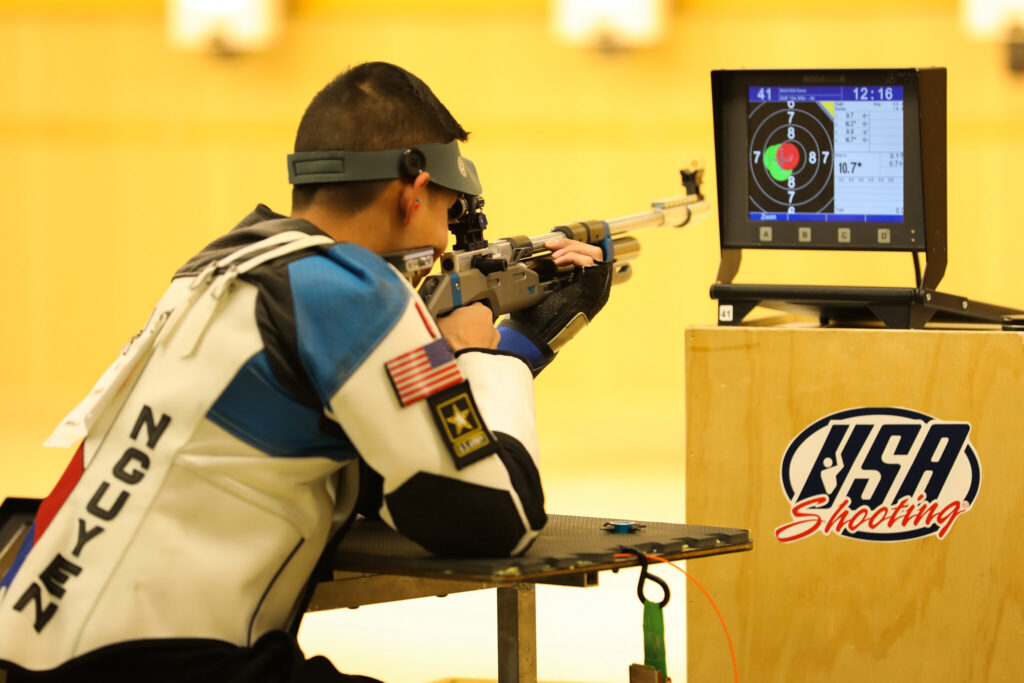
CC And did you have an epiphany at any point that steered you back on course?
SSKN At one point, I knew I had to accept my reality and stop feeling sorry for myself. I told myself that it was time to get up and get back to work. So that’s what I did.
CC In the process of getting the amputation done and to rehab and get to where you are today as an Army Marksmanship team member and a Paralympian, was the mental rehabilitation just as important as what you had to do from a physical standpoint? How did you find balance between the two on your journey?
SSKN I felt like I was getting back to normal. When I mean normal, I mean I wasn’t fighting any negative self-thoughts; I wasn’t wallowing in my own self-pity. I had goals; I had milestones that I was working towards. And it was a huge morale booster that I had my platoon sergeant (Sergeant First Class Robert Peredo) training with me every single day. He was my battle buddy through it all; he encouraged me, he pushed me to get better, he pushed my physical limits, and he never allowed me to slack off. We were hitting the gym twice a day, we ran, we rucked, we even shared a nutrition regiment together. I owe the majority of my recovery to him. He and I are still close to this very day. In 2022-23, my (then) fiancé and I traveled to his home in Guam for Christmas and New Year’s vacation. He retired as an E8 (master sergeant) after 24 years of service.
Where did I find the balance? Mostly through trial and error. I played around with a lot of workout regiments and plans. I painfully learned that my infantryman fit was not conducive to being shooter fit. I didn’t need to be benching 225 pounds; I didn’t need to be curling 30 pounds; I didn’t need to be (working) triceps at 90 pounds. I learned through lots of failures that I need to focus on medium weight and high reps. As much as I enjoy getting big and lifting heavy, getting big for my sport didn’t always produce the scores. After eight years of trial and error, I got the balance just right, but it also goes without saying I still continually train to maintain and meet the Army physical fitness standard.
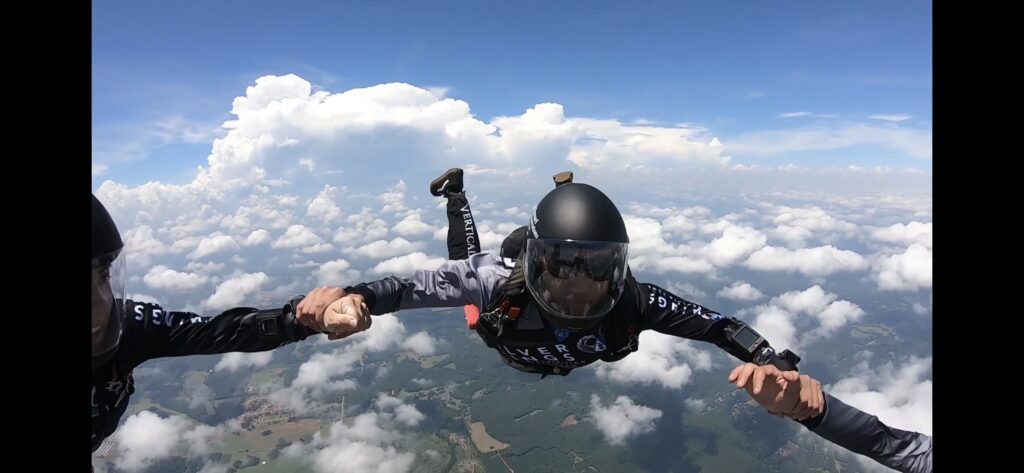
CC Tell me how the U.S. Army Marksmanship Team became a reality for you.
SSKN It was an opportunity that was afforded to me out of the blue. It was an unexpected journey that I made the best of.
CC How much has being on that team impacted your success in shooting?
SSKN Every bit of my success can be attributed to the Army Marksmanship Unit. I’ve been blessed to train alongside some of the best shooters in the world – eight Olympians in total. I wouldn’t be here without their guidance and support. Seeing their work ethic and success was inspiring and made me work harder.
CC You seemed to be a late bloomer to shooting sports. Growing up in Westminster, did you have any interest in shooting or hunting?
SSKN No, none at all. This wasn’t a reality for me until I came to the Army Marksmanship Unit.
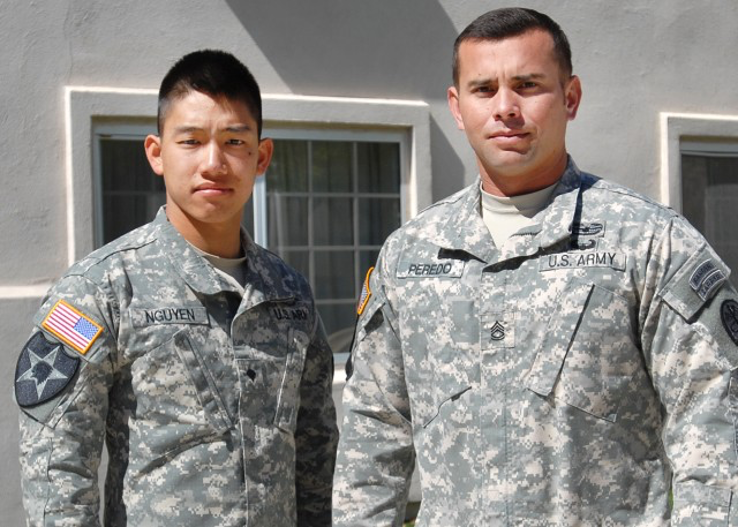
CC Speaking of your days in Southern California, while I think you’re a big inspiration for what you endured, it sounds like your parents inspired you when they left Vietnam after the war. Can you share some of their backstory and how their journey convinced you to join the Army and everything that’s come along with that?
SSKN My father, his brothers and sisters and both of my grandparents fled from Vietnam after the war ended in 1975. And from what I’ve been told, they were on the last few Chinook helicopters out of the U.S. Embassy. They came to the United States in hopes of a better life. For me, joining was my way of repaying them for that freedom and to maintain the freedom that they fought so hard for. My father and I did not see eye to eye when I first told him I was joining the Army. We fought for weeks about the issue, but I joined anyway. He really had a change of heart after I came home from One Station Unit Training. He saw how the Army had changed me and how much better it had made me. So, 13 years later, and to this day he is proud of me for still wearing the uniform.
CC I know you have a passion for skydiving and rock climbing, but have you embraced hunting at all since you’ve become a world-class shooter?
SSKN My first-ever hunting trip was to northwestern Pennsylvania. My now wife took me to her childhood farm to hunt with her family. As a California native and a Georgia resident (at Fort Moore), I’m not a fan of the cold, so she spent months trying to mentally prepare me for the misery of Pennsylvania rifle season in December. She regaled me with stories of standing in the bitter cold for hours on end.
That day, we showed up to the stand about 30 minutes before sunrise, and even before shooting time started we saw what we thought may be a deer only about 30 yards from the stand. About 30 seconds after shooting time officially started, my now sister-in-law fired a shot off in the distance, and when she did, sure enough, a huge doe popped up right in front of our stand. I took the shot as she stood motionless and broadside. By 8:15 a.m, we had her gutted and hanging and we were on our way to breakfast at the local restaurant.
To this day, my wife is still bitter about the experience and says that I had the easiest day of Pennsylvania hunting ever recorded, and that if you don’t almost lose your fingers from frostbite, it doesn’t count!

CC The Olympic Games are significantly publicized and covered, but having competed in Tokyo and now heading to Paris, can you speak to just how dedicated, competitive and badass Paralympians are? I guess I’m just hoping we in the media can tell more of your stories and emphasize how important it is to the Games to get more exposure that you’re working just as hard in your events as happens in the Olympics.
SSKN There is a great documentary on Netflix called Rising Phoenix, and I highly recommend it. It captures and talks about the journeys of Paralympians. Paralympic athletes are just as badass as Olympic athletes. They too put in the time, the dedication, the hours, the practice and the sacrifice to be a Paralympic athlete. They also share the same struggles and victories just like everyone else. They work and train hard for four years to make it count on the one day that matters most. Every one of those athletes that show up on the field of play are out to chase the same thing: They all want to be a Paralympic gold medalist. CS
Editor’s note: The Paralympics shooting schedule website is located at olympics.com/en/paris-2024/paralympic-games/schedule/ shooting-para-sport. For more on the U.S. Army Marksmanship Unit, check out army.mil/usamu.
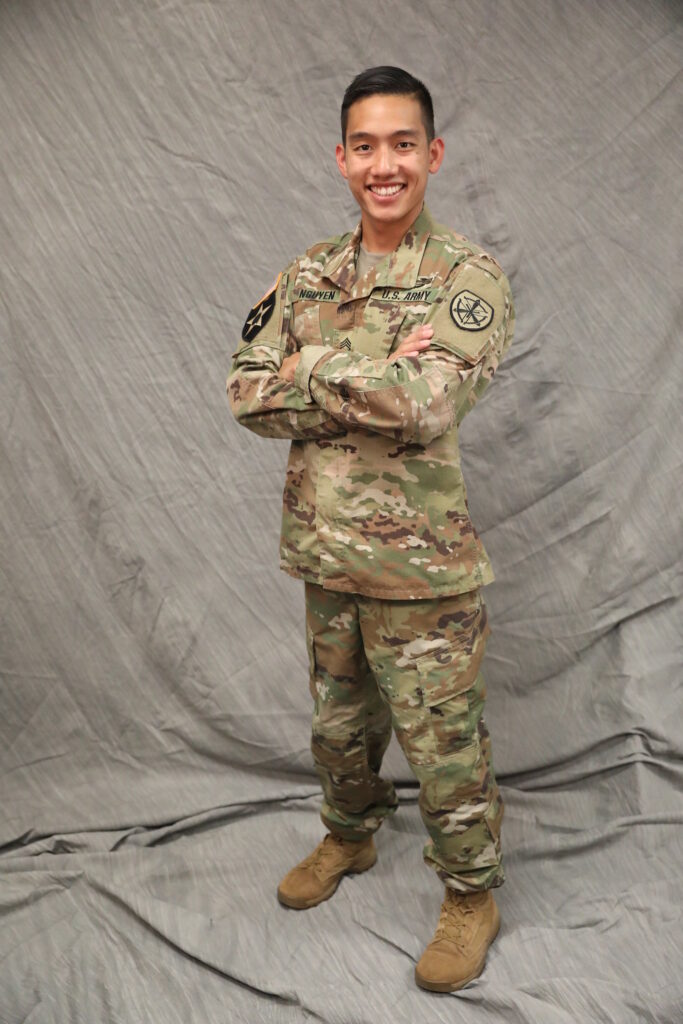
Sidebar THE CHOICES WE MAKE
One of my favorite Christmas presents I ever gifted my late dad was a simple coffee mug that read “My Kid And My Money Go To Fresno State.” Indeed, my father’s hard-earned dollars joined me on that collegiate adventure. Despite some squabbles between us as things unfolded, I hope I did my pop proud by earning my bachelor’s degree in journalism. He knew I loved sports and writing and wanted to pursue that career, which I did.
At the same time, I was proud he chose to leave high school early and join the United States Navy between World War II and the Korean War, serving some in the latter conflict before embarking on a long stint in the auto repair industry. He and I had different aspirations. I know I wasn’t a good candidate to join the armed forces and back in his day he had no interest in attending college, which brings me to this month’s interview with U.S. Army Marksmanship Unit Staff Sergeant Kevin Nguyen.
Nguyen, a Southern California native, is the son of immigrants who fled the Vietnam War for a better life in America.
Like my father, Nguyen chose to serve his country. He joined the Army, was wounded in Afghanistan and had his right leg amputated. A decade-plus later, he’ll represent the United States shooting team for a second straight Paralympic Games, this time in Paris. I’m so honored to share some of Nguyen’s thoughts about his injury, his family and why he’s proud of where his journey took him.
“The military is certainly not for everyone, but for those who feel called to it, you get out of it what you put into it,” he said. “Nothing will come easily, and your work ethic will determine your success.”
Nguyen earned my respect for just picking himself up after the catastrophic war wound he suffered. Those who he works with on a daily basis rave about his character.
“He is certainly open to sharing his story if asked and always lends an ear to someone that might be having a difficult time. Those are the qualities that have helped him become a mentor and coach to many of the younger members of both our team and the U.S./Paralympic Team as well,” said Sergeant First Class Hank Gray, the Marksmanship Unit’s assistant team chief in international rifle.
“One would expect him to have a little bitter taste in his mouth about the Army and combat, but he doesn’t at all. It’s quite the opposite; his perspective about what happened and his feeling of duty to the country have driven him to stay on active duty and even pursue special operations. It’s truly inspiring!”
I’ll be cheering on Staff Sgt. Nguyen from home as he takes on the best of the world in France. I’d like to think my dad would be excited to read my words. -Chris Cocoles



